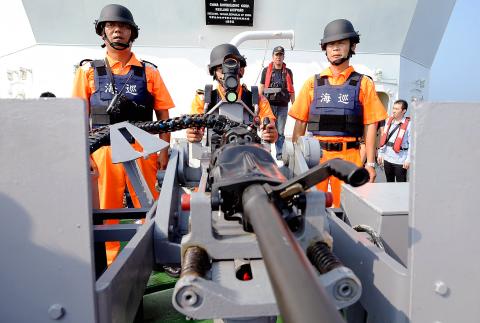The Coast Guard Administration (CGA) publicly demonstrated its procedures for escorting Taiwanese fishing boats operating near the Diaoyutai Islands (釣魚台) yesterday, in what was seen as a fresh attempt to assert the country’s sovereignty over the disputed island group.
A duty changeover between the 500-tonne Lienchiang and the 600-tonne Hualien patrol boats was opened to press and politicians yesterday.
CGA officials said Taiwan currently conducts patrol operations near the Diaoyutais around the clock and that onsite changeovers can help shorten response times in the event of contingencies.

Photo: Chu Pei-hsiung, Taipei Times
At present, the CGA has 161 ships and is expected to expand its fleet to 173 vessels by 2015.
The show of strength followed a decision by the Japanese government on Tuesday to buy three of the disputed islands from their private owner for ¥2.05 billion (US$26 million).
The Diaoyutais, known as the Senkakus in Japan, lie in the East China Sea, about 120 nautical miles (220km) northeast of Taiwan. The island group is claimed by Taiwan, Japan and China.
There have often been reports of Taiwanese fishermen being chased away from the area by Japan Coast Guard ships.
Describing the area as a traditional fishing ground of Taiwanese, President Ma Ying-jeou (馬英九) instructed the CGA to increase its escort profile to provide services on a daily basis during the fishing season.
However, some fishermen have urged the government to take tougher action to protect their rights.
Wu Yao-liang (吳耀亮), a fisherman based in Suao (蘇澳), Yilan County, said Taiwan should vigorously fight for its sovereignty over the Diaoyutais in order to bring Japan’s attention more sharply to the issue.
Meanwhile, Ministry of Foreign Affairs spokesman Steve Hsia (夏季昌) said Taiwan is keeping a close eye on Japan’s moves in the islands dispute.
Hsia’s remarks came after Taiwan recalled its representative to Japan Shen Ssu-tsun (沈斯淳) in response to Japan’s decision to buy the three privately owned islands.
Reiterating that the Diaoyutais are an inherent part of the Republic of China’s territory, Hsia said the nation would uphold its sovereignty over the islands when negotiating with Japan on fishing rights.
Taipei and Tokyo are currently negotiating the timing of the next round of talks on fishing rights, Hsia said, adding that no timetable had been set.
Taiwan would stick with the principles of safeguarding its sovereignty, shelving differences, pursuing peace and reciprocity, and jointly exploring resources to peacefully and rationally resolve territorial disputes, he said.
In related news, the ministry said Taipei does not recognize a unilateral move by the Philippines to rename the South China Sea as the West Philippine Sea of the Republic of the Philippines.
The ministry issued the statement in response to an administrative order recently signed by Philippine President Benigno Aquino III to officially rename the South China Sea.

SECURITY: As China is ‘reshaping’ Hong Kong’s population, Taiwan must raise the eligibility threshold for applications from Hong Kongers, Chiu Chui-cheng said When Hong Kong and Macau citizens apply for residency in Taiwan, it would be under a new category that includes a “national security observation period,” Mainland Affairs Council (MAC) Minister Chiu Chui-cheng (邱垂正) said yesterday. President William Lai (賴清德) on March 13 announced 17 strategies to counter China’s aggression toward Taiwan, including incorporating national security considerations into the review process for residency applications from Hong Kong and Macau citizens. The situation in Hong Kong is constantly changing, Chiu said to media yesterday on the sidelines of the Taipei Technology Run hosted by the Taipei Neihu Technology Park Development Association. With

CARROT AND STICK: While unrelenting in its military threats, China attracted nearly 40,000 Taiwanese to over 400 business events last year Nearly 40,000 Taiwanese last year joined industry events in China, such as conferences and trade fairs, supported by the Chinese government, a study showed yesterday, as Beijing ramps up a charm offensive toward Taipei alongside military pressure. China has long taken a carrot-and-stick approach to Taiwan, threatening it with the prospect of military action while reaching out to those it believes are amenable to Beijing’s point of view. Taiwanese security officials are wary of what they see as Beijing’s influence campaigns to sway public opinion after Taipei and Beijing gradually resumed travel links halted by the COVID-19 pandemic, but the scale of

A US Marine Corps regiment equipped with Naval Strike Missiles (NSM) is set to participate in the upcoming Balikatan 25 exercise in the Luzon Strait, marking the system’s first-ever deployment in the Philippines. US and Philippine officials have separately confirmed that the Navy Marine Expeditionary Ship Interdiction System (NMESIS) — the mobile launch platform for the Naval Strike Missile — would take part in the joint exercise. The missiles are being deployed to “a strategic first island chain chokepoint” in the waters between Taiwan proper and the Philippines, US-based Naval News reported. “The Luzon Strait and Bashi Channel represent a critical access

Pope Francis is be laid to rest on Saturday after lying in state for three days in St Peter’s Basilica, where the faithful are expected to flock to pay their respects to history’s first Latin American pontiff. The cardinals met yesterday in the Vatican’s synod hall to chart the next steps before a conclave begins to choose Francis’ successor, as condolences poured in from around the world. According to current norms, the conclave must begin between May 5 and 10. The cardinals set the funeral for Saturday at 10am in St Peter’s Square, to be celebrated by the dean of the College